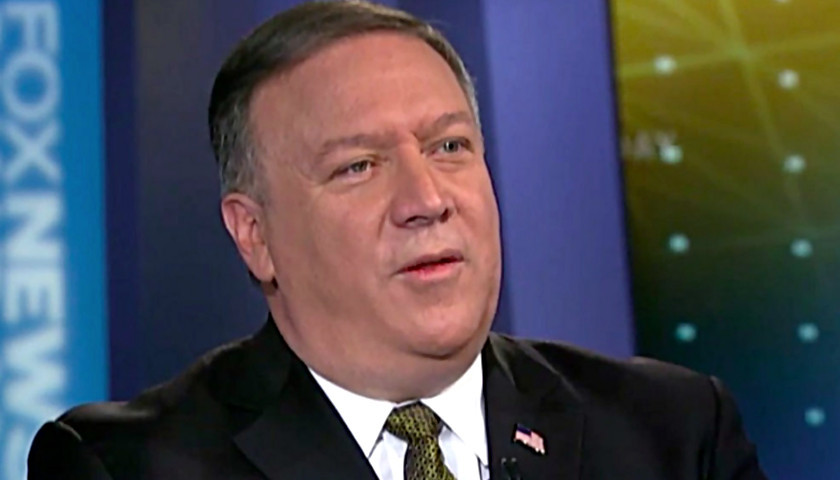by Joshua Gill
Secretary of State Mike Pompeo announced Monday that the U.S. will take only 30,000 refugees over the next fiscal year — the fewest since the 1980 Refugee Act.
The cap on refugees decreased from the 45,000 cap set for the current fiscal year and is the third such cutback on the yearly refugee cap President Donald Trump has implemented in a row. Pompeo said the lowered cap was necessary to allow the U.S. to deal with the backlog of 800,000 currently pending asylum seekers.
 “In consideration of both U.S. national security interest and the urgent need to restore integrity to our overwhelmed asylum system, the United States will focus on addressing the humanitarian protection cases of those already in the country,” Pompeo said, according to The Washington Post.
“In consideration of both U.S. national security interest and the urgent need to restore integrity to our overwhelmed asylum system, the United States will focus on addressing the humanitarian protection cases of those already in the country,” Pompeo said, according to The Washington Post.
International law requires countries to admit asylum seekers, but allows for judges to reject the cases of asylum seekers once they have been admitted into the country and deport them. Refugees, on the other hand, remain outside of the country while their cases are processed.
While the new cap on refugees represents a significant decrease from the previous year’s cap, fewer than 20,000 refugees have been admitted to the U.S. during the current fiscal year. That number is unlikely to increase enough to reach the 45,000 cap given the fact that there is only one month left to do so. Tougher screening processes the Trump administration implemented in 2017 in order to minimize the threat of potential terrorism mean that refugee cases and asylum applications take longer to process, which has contributed to the backlog of pending asylum cases.
Pompeo said the U.S. will likely process approximately 310,000 refugee and asylum applications over the 2019 fiscal year in addition to the cases already pending.
He also asserted that the refugee cap should not be considered the “sole barometer” of U.S. aid to refugees.
“[We will] target the application of foreign aid in a smarter way,” Pompeo said, according to The Wall Street Journal.
The secretary of state said the U.S. would focus on ending conflicts driving the refugee crisis, helping refugees to return to their home countries, and promoting the sharing of the refugee crisis burden among countries.
The United Nations Refugee Agency (UNHCR) said that there are 25.4 million people who are displaced outside of their own countries, 3.1 million asylum seekers and a total of 68.5 million people displaced worldwide, the majority of whom are displaced within their own countries.
Humanitarian organizations like Amnesty International criticized the U.S.’ lowered refugee caps.
“The Trump administration is abandoning this country’s promise to refugees,” Amnesty International said in a statement.
“Today’s announcement demonstrates another undeniable political attack against people who have been forced to flee their homes. This is the lowest goal in the history of the program, and compounded by this administration’s history of creating road block after road block for refugees to arrive, this must be perceived as an all-out attack against our country’s ability to resettle refugees both now and in the future,” the statement added.
– – –
Joshua Gill is a reporter at Daily Caller News Foundation. Follow Joshua on Twitter.






Imagine, for a moment, if the roles were reversed. Would you want to be shipped halfway around the world or would you rather be sent to a neighboring state? What if Tennessee were suddenly stricken with some tragedy – would you rather be relocated to Kentucky, Arkansas or, say, Uganda or Chad? In the latter case you’d have to learn a new language, you would be unable to make a legitimate living and therefore have to be dependent on the largess of a state that resents your presence. You would have to adapt to different customs and social mores. The food wouldn’t agree with you and your children would be coming home from school crying in frustration and anger for being unable to understand the lessons being taught.
Point is this: it is not only 5 to 10 times cheaper to relocate refugees closer to their home country, it is the far, far more compassionate move. These NGO’s don’t care about the refugees – they care about the revenue and the virtue signaling. The globalists love refugees – the more chaos they can cause the better – and if they get to send refugees abroad, who typically bring their battles with them, all the better – you not only destroy the refugees lives, you destroy the host nation in the bargain.
With the reduction in hostility in Syria, thousands upon thousands of refugees are returning from refuge in neighboring countries – how many have repatriated from the USA?
As a wealthy nation with relative stability, it is a compassionate gesture to offer refuge – but it is far better to offer refuge that does not add insult to injury by further disruption of life.
Approved